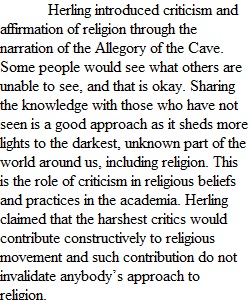


Q 1. According to Herling, what role should affirmation or criticism of religious beliefs and practices play in the academic study of religion? 2. What are some of the key terms of Jung’s theory of religion, and what do they mean? What are some of the examples Jung uses to illustrate and support his theories? 3. What are some of the key terms of Eliade’s theory of religion, and what do they mean? What are some of the examples Eliade uses to illustrate and support his theories? 4. What are some of the key terms of Smart’s theory of religion, and what do they mean? What are some of the examples Smart uses to illustrate and support his theories? 5. What are some of the key terms of Tillich’s theory of religion, and what do they mean? What are some of the examples Tillich uses to illustrate and support his theories? 6. What are some of the key terms of Smith’s theory of religion, and what do they mean? What are some of the examples Smith uses to illustrate and support his theories? 7. What are some of the key terms of Freud’s theory of religion, and what do they mean? What are some of the examples Freud uses to illustrate and support his theories? 8. What does it mean, for Freud, to call religion an illusion, and why does he refer to it as such? What wishes does religion fulfill for human beings, and why does he say that religion is the “universal obsessional neurosis of humanity? 9. What are some of the key terms of Marx’s theory of religion, and what do they mean? What are some of the examples Marx uses to illustrate and support his theories? 10. According to Marx, what is the relationship between religious and socioeconomic activity? What role does religion play for human beings within such activity? Why does Marx think that any critique of religion must also include social and economic critique? 11. Compare and contrast Marx and Freud. What similarities do you see among their respective theories of religion? What differences to you see? PreviousNext
View Related Questions